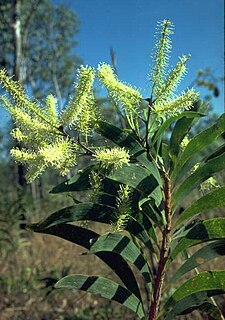
Grevillea crithmifolia is a species of flowering plant in the family Proteaceae and is endemic to the south-west of Western Australia. It is a dense shrub with linear leaves, divided leaves with narrowly oblong lobes, or both, and clusters of pale pink to creamy-white flowers.

Grevillea didymobotrya is a species of flowering plant in the family Proteaceae and is endemic to the south-west of Western Australia. It is an erect shrub with simple leaves, the size and shape depending on subspecies, and cylindrical groups of yellow or cream-coloured flowers.

Grevillea decurrens, also known as the clothes-peg tree, is a species of flowering plant in the family Proteaceae and is endemic to northern Australia. It is a shrub or tree with divided leaves, the lobes elliptic to egg-shaped with the narrower end towards the base, and conical groups of pink or cream-coloured flowers.

Grevillea irrasa is a species of flowering plant in the family Proteaceae and is endemic to south-eastern New South Wales. It is an erect, spreading shrub with oblong to egg-shaped leaves with the narrower end towards the base, and clusters of red to apricot-coloured flowers.

Grevillea oxyantha is a species of flowering plant in the family Proteaceae and is endemic to south-eastern continental Australia. It is an erect to spreading shrub with somewhat silky-hairy branchlets, broadly elliptic to broadly egg-shaped or almost round leaves, and hairy, crimson and pink flowers with a red style.

Grevillea polychroma , commonly known as Tullach Ard grevillea, is a species of flowering plant in the family Proteaceae and is endemic to eastern Victoria. It is a spreading to erect shrub with densely hairy branchlets, egg-shaped leaves, the narrower end towards the base, and down-turned clusters of hairy, cream-coloured, pale yellow or pink to red flowers.

Grevillea bemboka is a species of flowering plant in the family Proteaceae and is endemic to a restricted area of far south-eastern New South Wales. It is a spreading to erect shrub with hairy branchlets, egg-shaped to elliptic leaves and red or reddish-pink flowers.

Grevillea biformis is a species of flowering plant in the family Proteaceae and is endemic to the south-west of Western Australia. It is a shrub with linear leaves and cylindrical clusters of creamy white or pale pink flowers.
Grevillea kedumbensis is a species of flowering plant in the family Proteaceae and is endemic to a restricted locale in the Great Dividing Range in central New South Wales in Australia. It is a twiggy shrub with narrowly elliptic to egg-shaped leaves with the narrower end towards the base, and clusters of hairy green to cream-coloured flowers.
Grevillea brevis is a species of flowering plant in the family Proteaceae and is endemic to the Northern Territory. It is an erect, open shrub with elliptic leaves and white to yellow or creamy-green flowers.
Grevillea glabrescens is a species of flowering plant in the family Proteaceae and is endemic to the Northern Territory. It is an open, erect shrub with oblong leaves that have triangular teeth or lobes on the edges, and clusters of white to cream-coloured or very pale yellow flowers.
Grevillea granulifera is a species of flowering plant in the family Proteaceae and is endemic to eastern New South Wales. It is a shrub with narrowly elliptic leaves and clusters of pinkish-red and creamy-white flowers.

Grevillea mimosoides, commonly known as caustic bush, is a species of flowering plant in the family Proteaceae and is endemic to northern Australia. It is a shrub or small tree with curved, narrowly elliptic or egg-shaped leaves and greenish-white to cream-coloured or pale yellow flowers.

Grevillea dryandri is a species of flowering plant in the family Proteaceae and is endemic to northern Australia. It is a spreading to erect shrub with divided leaves with up to seventy or more linear to narrowly elliptic leaves, and long clusters of red, orange-red, pink or white flowers.

Grevillea bracteosa, also known as bracted grevillea, is a species of flowering plant in the family Proteaceae and is endemic to the south-west of Western Australia. It is an erect to spreading shrub usually with linear leaves, and oval to more or less spherical clusters of glabrous pale green to greenish-pink flowers with a pink or white style.

Grevillea florida is a species of flowering plant in the family Proteaceae and is endemic to the south-west of Western Australia. It is a erect, low shrub with linear to narrowly elliptic leaves, and clusters of hairy, white to creamy yellow flowers with a yellow- or orange-tipped style that ages to red.
Grevillea myosodes is a species of flowering plant in the family Proteaceae and is endemic to north-western Australia. It is a spreading shrub with elliptic leaves and branched clusters of cream-coloured flowers.

Grevillea prasina is a species of flowering plant in the family Proteaceae and is endemic to north-western Australia. It is a spreading or straggly shrub with egg-shaped to elliptic leaves with coarsely-toothed edges, and dense, cream-coloured to pale yellow flowers, the style pale green to white.
Grevillea dunlopii is a species of flowering plant in the family Proteaceae and is endemic to the northern part of the Northern Territory. It is a spreading shrub with divided leaves with nine to seventeen spreading lobes, and pale cream-coloured to white flowers.

Grevillea goodii, also known as Good's grevillea, is a species of flowering plant in the family Proteaceae and is endemic to the Northern Territory. It is a prostrate shrub with egg-shaped to narrowly elliptic leaves and clusters of light green flowers with a pink to red style.














